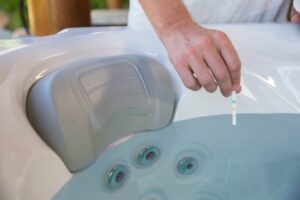3 Ways Hydrotherapy Helps Fibromyalgia Syndrome
The health benefits of water should never be underestimated.
Water’s helped reduce inflammation in stiff joints, soothe tired muscles after a long day, and allow people who wouldn’t normally be able to exercise receive some physical activity. It’s also one of the treatments considered by those suffering from fibromyalgia syndrome (FMS).
What Is Fibromyalgia Syndrome?
The Mayo Clinic defines FMS as “a disorder characterized by widespread musculoskeletal pain accompanied by fatigue, sleep, memory, and mood issues.” Mayo notes that though the disease can’t be cured, there are several measures patients can take to reduce their symptoms, including exercise, relaxation, and stress reduction.
This is where hydrotherapy comes in.
How Does Hydrotherapy Help Fibromyalgia?
While some researchers doubt the ability for hot tubs and spas to have a positive impact on the suffering of FMS patients, others have found great success. A review published in 2008 in Rheumatology International confirmed that hydrotherapy is a strong candidate for managing FMS symptoms.
The reviewers made sure to run controlled trials on patients who qualified as having FMS. Most of these patients were women, and most underwent 20 minutes of hydrotherapy treatments. In the end, the reviewers found patients experienced an overall improvement in pain reduction and in their quality of life, including better sleep and less depression.
Exercise on the whole is good for people with FMS, but because water reduces the stress on your joints and movements, hydrotherapy is a solution that FMS patients should look to.
What Steps Can I Take to Treat My Fibromyalgia With Hydrotherapy?
It’s always best to ask a doctor about hydrotherapy treatment for FMS. If you’re given the go-ahead, consider investing in a high-quality spa for your backyard, and start planning a workout routine with supervision from a professional therapist that you can do to help manage your symptoms. And remember; ask your doctor how a prescription for a hot tub can be submitted to your insurance and your accountant how it can be deducted from your taxes.
You’ll be able to enjoy your spa when you’re not using it for managing your FMS, and you’ll have an overall happier life because of it.
What’s one way spas have improved your health and quality of life? Share your story in the comments!
Share this blog post!
Hours
Mon – Sat: 10:00 AM – 6:00 PM
Sun: 12:00 PM – 5:00 PM
Appointments: Anytime
© 2024 Imagine Backyard Living All rights reserved. Made with by IMP Digital







